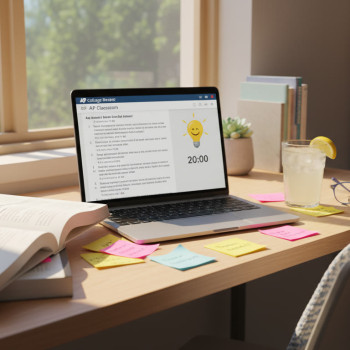Why hydration matters when you’re prepping for the Digital SAT
When you’re drilling practice tests, memorizing grammar rules, or solving a tricky math section at midnight, hydration probably isn’t the first thing on your mind. But think of water as invisible study fuel: it’s quiet, constant, and underpins almost everything your brain does. Small dips in hydration can make you feel foggy, slow down reaction time, and make concentration more brittle — exactly the opposite of what you want on test day or during a long afternoon study session.
This guide is written for students who want practical, friendly, and realistic hydration strategies that actually fit into everyday study life. You’ll find science-grounded tips, clear routines, snack ideas, and an exam-day plan. Along the way I’ll also mention how Sparkl’s personalized tutoring can help you build those routines into your broader SAT study strategy with 1-on-1 guidance and tailored study plans that factor in your daily rhythms.
The basics: how hydration affects thinking and stamina
Water is involved in neurotransmission, nutrient transport, and maintaining consistent body temperature — all things that influence attention, memory retrieval, and endurance. For students preparing for the Digital SAT, the most relevant effects are:
- Sharper concentration and fewer careless mistakes.
- Improved ability to retrieve facts and vocabulary under pressure.
- Better mood regulation and reduced test anxiety intensity.
- More stable physical energy during long study blocks and exam days.
Remember: hydration isn’t a single number that fits everyone. Age, body size, activity level, climate, and diet all matter. Instead of chasing a magic liter figure, aim for consistent sipping, smart fueling, and rhythm—especially around practice tests and the real exam.
Practical hydration rules for SAT students
1. Sip steadily — don’t binge
Drinking a large amount of water all at once may leave you uncomfortable and distracted. Instead, keep a water bottle within reach and take small, regular sips. This steady approach keeps blood volume stable, which helps your brain perform consistently over hours of study.
2. Time fluids around focused tasks
Before starting a 50–90 minute study block, drink 8–12 ounces of water. During the block, take sips every 10–15 minutes. After the block, drink again and refuel with a light snack if needed. This timing helps you avoid both dehydration and the urgent need for a restroom break at a bad moment.
3. Pair water with electrolytes when needed
If you’re exercising, it’s hot where you live, or you sweat a lot, plain water can dilute electrolytes and make you feel sluggish. For longer study sessions (3+ hours) that include activity or in warm conditions, add a modest electrolyte option — a pinch of salt and a squeeze of citrus in water, or a low-sugar electrolyte drink. The goal is balance: replenish sodium and potassium without spiking sugar.
4. Start the day hydrated
First thing in the morning, drink a cup of water. Overnight fasting mildly dehydrates you; a morning sip jump-starts metabolism and mental clarity. If morning practice tests are part of your schedule, give yourself 20–30 minutes after that initial drink before heavy concentration to allow digestion and steady focus.
5. Use foods to hydrate
Hydration isn’t only liquids. Many fruits and vegetables carry a high water content and offer vitamins and slow-release energy. Combine fluids with smart snacks for sustained focus:
- Watermelon or cantaloupe slices (high water content and natural sugars).
- Cucumber and cherry tomatoes with hummus.
- Greek yogurt with berries — hydration plus protein for steady energy.
How to plan hydration across a typical study week
Consistency across days builds a stable baseline. Here’s a practical weekly approach you can adapt:
- Weekday study sessions (1–2 hours): sip water continuously; include a hydrating snack mid-session.
- Long practice test days (3–4 hours with breaks): pre-hydrate before the test, take a moderate electrolyte drink if needed, and schedule water and snack breaks aligned with the test’s allotted pauses.
- Exercise days: increase fluids before and after workouts; include electrolytes if workouts are intense.
Sample hydration schedule (easy to follow)
| Time | What to drink/eat | Why it helps |
|---|---|---|
| Upon waking | 8–12 oz room-temperature water | Rehydrates after sleep; improves morning focus |
| 30 minutes before study | 6–8 oz water + light snack (banana or yogurt) | Prevents mid-session hunger and stabilizes energy |
| Every 15–20 minutes during study | Small sips — aim for 6–12 oz per hour total | Maintains steady cognition and attention |
| Mid-study break | 6–8 oz water + hydrating snack (fruit, cucumber) | Resets focus and replenishes fluids |
| Evening wind-down | 6–8 oz herbal tea or water | Hydrates without disrupting sleep if consumed early enough |
Hydration strategies for practice tests and exam day
Practice tests are training grounds for everything: pacing, stamina, mental endurance, and your hydration plan. Treat them like dress rehearsals for the main event.
On practice test days
- Follow the sample schedule above and note what felt right or off. Did you need the bathroom excessively? Did you feel foggy in the later sections? Adjust sip frequency or pre-test intake accordingly.
- Bring the same water bottle and snacks you plan to use on test day. Familiarity reduces surprises.
- Time your pre-test fluid so you’re comfortable but not bloated when the clock starts.
On the actual exam day
Rules and logistics vary, but in most modern test centers you can bring a clear bottle and take restroom breaks during scheduled times. Here’s a calm, stepwise plan:
- The night before: hydrate steadily; avoid heavy alcohol, excess caffeine, and very salty meals.
- Morning of the test: 12–16 oz of water when you wake up. A light, hydrating breakfast (oatmeal with fruit, yogurt, whole-grain toast) helps too.
- 30–60 minutes before the test: another 6–8 oz and some light carbs for stable glucose.
- During breaks: sip water and eat small, familiar snacks to maintain energy (a banana, a few nuts, or a granola bar).
- Avoid new or unusual drinks on exam day; stick to what you tested during practice runs.
Smart beverage choices — what to pick and what to skip
Not all drinks are created equal for focused studying. Here’s a quick guide.
Great choices
- Plain water (room temp or lightly chilled).
- Infused water (lemon, cucumber, mint) for flavor with minimal sugar.
- Herbal teas (caffeine-free) for evening study sessions.
- Low-sugar electrolyte drinks when exercising or in hot weather.
Use sparingly
- Plain coffee or tea: helps alertness but can dehydrate and disrupt sleep if overused.
- Low to moderate caffeine sodas: short energy boost but often high in sugar and poor for steady cognition.
Avoid before long study blocks or exams
- Highly sugary drinks or energy shots — they cause sugar crashes.
- Large volumes of caffeine late in the day — they interfere with sleep quality, which undermines learning.
Snacks that hydrate and fuel cognition
Hydrating snacks also supply the glucose and protein your brain needs for complex thinking. Try these smart combos during long study sessions:
- Greek yogurt + berries (protein + water-rich fruit)
- Apple slices + peanut butter (fiber + healthy fats)
- Hummus + carrot/cucumber sticks (electrolytes + crunch)
- Trail mix with nuts, seeds, and a few dried fruit pieces (portable and sustaining)
Common problems and fixes
Problem: I forget to drink when I’m focused
Fix: Set gentle timers on your phone or use an app that nudges you every 15–20 minutes. Associate a sip with a micro-routine: every time you change sections or complete a 25-minute pomodoro, take three deliberate sips.
Problem: I get up too often for the bathroom
Fix: Reduce how much you drink right before a long focused block. Shift more of your intake to 30–60 minutes before the block starts, and sip moderately during it.
Problem: I rely on coffee and feel jittery
Fix: Swap some caffeinated drinks for water and low-caffeine tea. If you need caffeine, keep it to a small, consistent daily amount and stop by early afternoon to protect sleep.
Tracking progress: how to tell if your hydration plan is working
Hydration effects are subtle but trackable. Watch for these signals over a week or two:
- Improved ability to sit through longer practice blocks without mental fatigue.
- Fewer careless reading/misread errors late in practice tests.
- More consistent moods and less test-time anxiety spikes.
- Better sleep quality when you avoid late-night heavy caffeine or fluids.
Example one-week hydration and study plan
This sample aligns hydration with study sessions and rest. Adjust quantities to your size and needs.
| Day | Morning | Afternoon | Evening |
|---|---|---|---|
| Monday | 8–12 oz water + light breakfast; 1-hour focused study | Sip water during 90-min practice; hydrating snack at break | Herbal tea, light review, stretch |
| Wednesday | 12 oz water; vocabulary flashcards for 30 min | Longer math block; electrolyte option if active | Protein snack, review errors |
| Saturday | Full-length practice test — pre-hydrate 30 min before | During breaks: water + banana; reflect on stamina | Light stretching, early bed |
How hydration ties into your broader SAT strategy
Studying for the Digital SAT isn’t just about the hours you spend — it’s about how well your body and mind cooperate during those hours. Hydration is a simple, high-impact lever that makes aggressive study schedules more sustainable. When you pair steady hydration with targeted practice, sleep, and nutrition, you reduce the chances that fatigue or a foggy afternoon will mask your real ability.
If you want help weaving these habits into a study plan that matches your strengths and weaknesses, Sparkl’s personalized tutoring offers 1-on-1 guidance, tailored study plans, expert tutors who can help you schedule practice tests, and AI-driven insights to spot when endurance or timing is hurting scores. That kind of coaching can make hydration and study habits feel purposeful instead of another checkbox to manage.
Quick checklist: what to pack for an exam or long study day
- Clear water bottle (tested in practice)
- One hydrating snack (banana, yogurt, or cut fruit)
- Small pack of nuts or a granola bar for steady energy
- Optional: low-sugar electrolyte pack if you anticipate heat or extra activity
- Phone alarm set to subtle reminder tones during practice test breaks
Final thoughts: hydration as part of a calm, confident test approach
Preparing for the Digital SAT can feel intense, but small, steady choices make a huge difference. Hydration is one of those choices that is easy to implement and pays subtle, reliable dividends in clarity, energy, and endurance. Over time, a mindful hydration routine becomes invisible — you stop thinking about it and simply perform at your best.
Start by experimenting with the sample schedule during a few practice tests. Track how you feel in later sections and tweak sip timing, snack choices, and caffeine to match your body. If you want accountability or a plan that syncs with your practice tests, consider working with a tutor who builds these habits into your personalized study plan — Sparkl’s 1-on-1 coaching and tailored strategies can help you turn hydration from a good idea into a regular advantage.
Hydrate early, sip often, and remember: the best test strategy is one that preserves your clear thinking. You’ve got this.
Want a quick starter habit?
Put a full water bottle on your desk before you begin. Promise yourself you’ll finish at least half by the end of the first study hour. Small commitments create momentum — and momentum beats cramming every time.












No Comments
Leave a comment Cancel